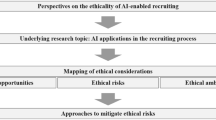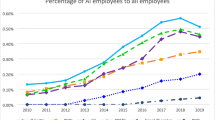Abstract
Organizations are increasingly employing algorithms to recruit candidates suitable for the jobs on offer. One important responsibility that organizations in their recruitment efforts need to achieve is that decisions are made in ways that promote inclusiveness and diversity of the workforce. Recruitment efforts today are increasingly being automated, due to a widespread belief that algorithmic decision-making will reveal less biased evaluations, as such increasing the likelihood that the ethical value of inclusiveness will not be violated. The reality, however, is that algorithmic decision-making is also biased and therefore we introduce solutions for data scientists to ensure that inclusiveness is optimized in designing algorithms. We conclude that organizations employing algorithms in their recruitment efforts need to create awareness about the importance of inclusiveness and ensure that data scientists and business experts work together in fine-tuning algorithmic decision-making to achieve inclusiveness.
Similar content being viewed by others
References
Bennett, N., Lemoine, J.: What VUCA really means for you. Harvard Bus. Rev. 92, 27 (2014)
Hollander, E.P.: Inclusive leadership: The essential leader-follower relationship. Routledge, Taylor & Francis Group, New York (2009)
McKinsey & Company: Diversity wins: how inclusion matters. Retrieved from: https://www.mckinsey.com/featured-insights/diversity-and-inclusion/diversity-wins-how-inclusion-matters (2020). Accessed May 19 2020
Deloitte: Automation with intelligence: reimagining the organization in the ‘Age of With’. Retrieved from: https://www2.deloitte.com/us/en/insights/focus/technology-and-the-future-of-work/intelligent-automation-technologies-strategies.html (2019). Accessed Jan 12 2021
Hall, J.V., Horton, J.J., & Knoepfle, D.T.: Pricing efficiency in designed markets: the case of ride-sharing. Retrieved from: https://www.semanticscholar.org/paper/Pricing-Efficiently-in-Designed-Markets%3A-The-Case-Hall-Horton/c96ad4e51587c3d7ed900f7a90da1d2dd86337bb?p2df (2019). Accessed Jan 12 2021
Cowgill, B.: Automating judgement and decision-making: theory and evidence from résumé screening. In: Columbia University, 2015 Empirical Management Conference (2017)
Kuncel, N.R., Klieger, D.M., Connelly, B.S., Ones, D.S.: Mechanical versus clinical data combination in selection and admission decisions: a meta-analysis. J. Appl. Psychol. 98, 1060–1072 (2013)
Carey, D., Smith, M.: How companies are using simulations, competition and analytics to hire. Harvard Bus. Rev. Retrieved from https://hbr.org/2016/04/how-companies-are-using-simulationscompetitions-and-analytics-to-hire (2016). Accessed Jan 12 2021
Hoffman, M., Kahn, L.B., Li, D.: Discretion in hiring. Q. J. Econ. 133, 765–800 (2018). https://doi.org/10.1093/qje/qjx042
Wilson, H., Alter, A., Shukla, P.: Companies are reimagining business processes with algorithms. Harvard Bus. Rev. Retrieved from: https://hbr.org/2016/02/companies-are-reimagining-business-processes-with-algorithms (2016). Accessed Jan 12 2021
Ghumman, S., Ryan, A.M., Barclay, L.A., Markel, K.S.: Religious discrimination in the workplace: a review and examination of current and future trends. J. Bus. Psychol. 28(4), 439–454 (2013)
Posthuma, R.A., Campion, M.A.: Age stereotypes in the workplace: common stereotypes, moderators, and future research directions. J. Manag. 35, 158–188 (2009)
Wynn, A.T., Correll, S.J.: Combating gender bias in modern workplaces. In: Risman, B.J., Froyum, C.M., Scarborough, W.J. (eds.) Handbook of the sociology of gender, pp. 509–521. Springer, Cham (2018)
Mackenzie, L., Wehner, J., Correll, S.J.: Why most performance evaluations are biased, and how to fix them. Harvard Bus. Rev. Retrieved from: https://hbr.org/2019/01/why-most-performance-evaluations-are-biased-and-how-to-fix-them (2019). Accessed Jan 12 2021
De Cremer, D., McGuire, J., Hesselbarth, Y., Mai, M.: Can algorithms help us decide who to trust? Harvard Bus. Rev. Retrieved from: https://hbr.org/2019/06/can-algorithms-help-us-decide-who-to-trust (2019). Accessed Jan 12 2021
Rosenbaum, B.: IBM artificial intelligence can predict with 95% accuracy which workers are about to quit their jobs. CNBC. Retrieved from: https://www.cnbc.com/2019/04/03/ibm-ai-can-predict-with-95-percent-accuracy-which-employees-will-quit.html (2019). Accessed Jan 12 2021
De Cremer, D.: What does building a fair AI really entail? Harvard Bus. Rev. Retrieved from: https://hbr.org/2020/09/what-does-building-a-fair-ai-really-entail (2020)
Japkowicz, N., Stephen, S.: The class imbalance problem: a systematic study. Intell. Data Anal. 6, 429–449 (2002)
Provost, F., Fawcett, T.: Data science for business: what you need to know about data mining and data-analytic thinking. O’Reilly Media (2013)
Snyder, K.: The resume gap: are different gender styles contributing to tech’s dismal diversity. Fortune Magazine. Retrieved from: https://fortune.com/2015/03/26/the-resume-gap-women-tell-stories-men-stick-to-facts-and-get-the-advantage/ (2015). Accessed Jan 12 2021
Author information
Authors and Affiliations
Corresponding author
Ethics declarations
Conflict of interest
On behalf of all authors, the corresponding author states that there is no conflict of interest.
Additional information
Publisher's Note
Springer Nature remains neutral with regard to jurisdictional claims in published maps and institutional affiliations.
Rights and permissions
About this article
Cite this article
De Cremer, D., De Schutter, L. How to use algorithmic decision-making to promote inclusiveness in organizations. AI Ethics 1, 563–567 (2021). https://doi.org/10.1007/s43681-021-00073-0
Received:
Accepted:
Published:
Issue Date:
DOI: https://doi.org/10.1007/s43681-021-00073-0




